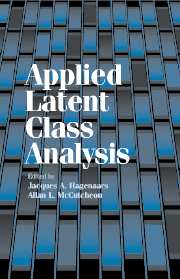Book contents
- Frontmatter
- Contents
- Contributors
- Preface
- INTRODUCTION
- CLASSIFICATION AND MEASUREMENT
- CAUSAL ANALYSIS AND DYNAMIC MODELS
- UNOBSERVED HETEROGENEITY AND NONRESPONSE
- 12 A Latent Class Approach to Measuring the Fit of a Statistical Model
- 13 Mixture Regression Models
- 14 A General Latent Class Approach to Unobserved Heterogeneity in the Analysis of Event History Data
- 15 Latent Class Models for Contingency Tables with Missing Data
- Appendix A: Notational Conventions
- Appendix B: Further Readings
- Appendix C: Selected Software; Webpage
- Index
14 - A General Latent Class Approach to Unobserved Heterogeneity in the Analysis of Event History Data
Published online by Cambridge University Press: 31 July 2009
- Frontmatter
- Contents
- Contributors
- Preface
- INTRODUCTION
- CLASSIFICATION AND MEASUREMENT
- CAUSAL ANALYSIS AND DYNAMIC MODELS
- UNOBSERVED HETEROGENEITY AND NONRESPONSE
- 12 A Latent Class Approach to Measuring the Fit of a Statistical Model
- 13 Mixture Regression Models
- 14 A General Latent Class Approach to Unobserved Heterogeneity in the Analysis of Event History Data
- 15 Latent Class Models for Contingency Tables with Missing Data
- Appendix A: Notational Conventions
- Appendix B: Further Readings
- Appendix C: Selected Software; Webpage
- Index
Summary
INTRODUCTION
In the context of the analysis of survival and event history data, the problem of unobserved heterogeneity, or the bias caused by not being able to include particular important explanatory variables in the regression model, has received a great deal of attention (see, e.g., Vaupel et al., 1979; Heckman and Singer, 1982, 1984; Chamberlain, 1985; Trussell and Richards, 1985; Yamaguchi, 1986; Mare, 1994; Guo and Rodriguez, 1994). The reason for this is that this phenomenon has a much larger impact in hazard models than in other types of regression models: Unobserved heterogeneity may introduce, among other things, downward bias in the time effects, spurious effects of time-varying covariates, spurious time-covariate interaction effects, and dependence among competing risks and repeatable events. This may be true even if the unobserved heterogeneity is uncorrelated with the values of the observed covariates at the start of the process under study.
The models that have been proposed to correct for unobserved heterogeneity differ mainly with respect to the assumptions made about the distribution of the latent variable capturing the unobserved heterogeneity. Heckman and Singer (1982, 1984) proposed a nonparametric random-effects approach that is strongly related to latent class analysis (LCA). Vermunt (1996a, 1997a) proposed extending their latent class (LC) approach by specifying simultaneously with the event history model a system of logit models (or causal loglinear model) for the covariates.
- Type
- Chapter
- Information
- Applied Latent Class Analysis , pp. 383 - 407Publisher: Cambridge University PressPrint publication year: 2002
- 13
- Cited by



